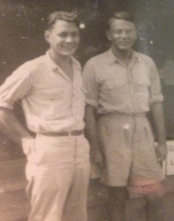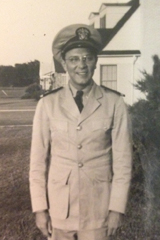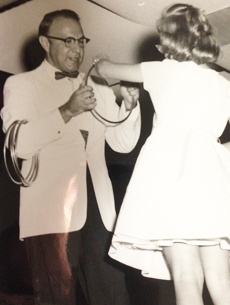© 2015 The Texas Lawbook.
By Brooks Igo
(April 13) – It was December in 1941. Royal Brin was driving along Harvard Square on his way to begin a graduate fellowship program at Harvard Law School when he heard the devastating news.
The Imperial Japanese Navy had conducted a deadly surprise attack on the U.S. naval base at Pearl Harbor. The next day, the U.S. declared war on Japan.
Brin decided to change his plans. He applied for a commission in the Navy and ended up serving through the end of World War II, mostly in the South Pacific.
While serving at a base in Guadalcanal, Brin’s fellow servicemen found out he was a lawyer. He soon became the base’s legal officer and set up shop in a small hut with an inconspicuous sign that read “Guadalcanal Legal Office.” It was his first job as a newly-minted lawyer.
 Despite being engaged in one of the most pivotal campaigns of the South Pacific theater, Brin managed to prepare for his life after the war. He used a Martindale-Hubbell Law Directory to write to law firms in his hometown of Dallas about a job after the completion of his service. He wrote to six law firms and ended up securing a job with Strasburger & Price.
Despite being engaged in one of the most pivotal campaigns of the South Pacific theater, Brin managed to prepare for his life after the war. He used a Martindale-Hubbell Law Directory to write to law firms in his hometown of Dallas about a job after the completion of his service. He wrote to six law firms and ended up securing a job with Strasburger & Price.
Brin celebrated his 70th anniversary at the firm last month. His long and successful career has earned his reputation as one of the deans of the Texas appellate bar.
When he joined Strasburger in 1946, Brin was the eighth lawyer at the firm. Today, the Dallas-based firm has grown to more than 230 lawyers in five Texas offices and outposts in New York, Mexico City and Washington, D.C.
The 96-year-old Brin continues to show up at the office every day. His wife, Carol, insists he “get out of the house for a few hours.” One can find him walking the 43rd floor, attending one of the appellate section’s meetings or enjoying a cup of coffee.
“I’ve enjoyed my time here,” he said. “I’d like to stay around and keep up with the law.”
 Brin grew up in South Dallas on Forest Avenue, which today is Martin Luther King Jr. Boulevard. He graduated from what is now James Madison High School and went on to get his law degree from the University of Texas.
Brin grew up in South Dallas on Forest Avenue, which today is Martin Luther King Jr. Boulevard. He graduated from what is now James Madison High School and went on to get his law degree from the University of Texas.
When he returned to his hometown after serving in World War II, he started his practice at Strasburger as a courthouse runner. He soon handled everything from workman’s compensation claims to defending insurance companies in personal injury and death cases.
One of Brin’s key early cases came when Henry Strasburger, the firm’s founder, asked him to represent the former mayor of Lubbock in a dispute regarding the ownership of a television station in West Texas.
It was a particularly significant case because the former mayor, Dub Miller, was also Strasburger’s cousin. Brin tried the case and won it.
As a token of his appreciation, Miller gave Brin a book with the words “A Million Thanks” inscribed on the spine. When he opened the book, ‘thanks’ was written on every line of every page.
“I’ve never counted the number of ‘thanks,’ but I’ve always assumed that there were a million ‘thanks,’” Brin said.
As his career developed, Brin ended up carving out an expertise and focus in appellate law through his colleague Hobert Price, who was one of the first lawyers in Texas to treat appellate law as a specialty. At that time, most trial lawyers handled their own appeals.
Price created one of the first appellate sections at a law firm in the state. Brin took the reins of the practice when Price retired.
The biggest case of Brin’s career resulted from the famous Pennzoil v. Texaco litigation in which a jury awarded Pennzoil more than $10 billion. Brin said he was approached by both sides to work on an appeal after the initial verdict, but he decided to work with Pennzoil and legendary trial lawyer Joe Jamail.
“One of the smartest things Pennzoil did was hire Joe Jamail,” he said. “He knew how to talk to a jury.”
Texaco argued on appeal that the judge that issued the verdict was not authorized to sit on the case. The original trial judge was unable to finish the case, so a retired judge came on.
Brin and Pennzoil asserted the judge was indeed qualified to sit and won the appeal.
Brin is known by many to be soft-spoken and mild-mannered, but Michael Jung, the current chair of Strasburger’s appellate practice, says that is not always the case, especially in court.
“I liken Royal to a desert flower,” Jung said. “He opens up and blooms during a rainstorm.”
In addition to his legal savvy, Brin is revered around the office for his magic tricks. Though he has been a practicing attorney for 70 years, he has been a practicing magician for much longer.
He first became interested in magic at the age of eight. His great uncle was a magician and used to pull coins from behind Brin’s ear.
Brin honed his craft in his early years and eventually joined the International Brotherhood of Magicians. He served as president of IBM from 1969-1970 and faithfully attended the organization’s conventions up until last year. His favorite trick to perform is the linking rings.
 Perhaps as incredible as the linking rings is the transformation of technology in the legal profession since he began. Brin first made copies of documents using carbon paper. He has since used mimeographs, copy machines and computers.
Perhaps as incredible as the linking rings is the transformation of technology in the legal profession since he began. Brin first made copies of documents using carbon paper. He has since used mimeographs, copy machines and computers.
Another significant change in the practice of law that Brin notes is the increased specialization of young lawyers. While lawyers of his vintage handled a wide variety of matters, today’s up-and-comers are encouraged to develop an expertise in a particular subject matter such as tax or securities law.
“In one way it is a loss,” he said. “It would help with the development of lawyers to have broad experience. And more trial experience.”
Brin’s single most important piece of advice for junior lawyers today is to find a mentor in the field you want to be in.
© 2016 The Texas Lawbook. Content of The Texas Lawbook is controlled and protected by specific licensing agreements with our subscribers and under federal copyright laws. Any distribution of this content without the consent of The Texas Lawbook is prohibited.
If you see any inaccuracy in any article in The Texas Lawbook, please contact us. Our goal is content that is 100% true and accurate. Thank you.
